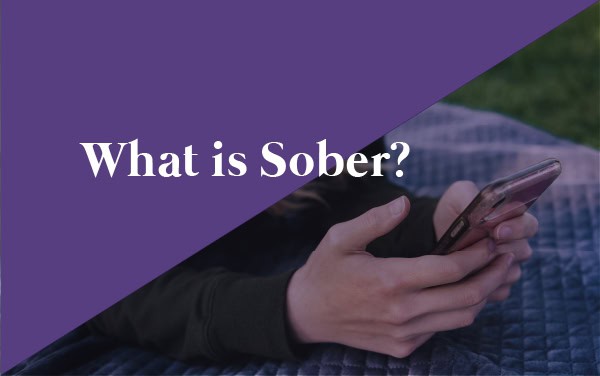
by Kerri MacFarlane | Jun 13, 2022 | Blog, Early Sobriety, Helpful Tips, Uncategorized
What is sober? What is sobriety? Can we define this? Let’s try!
Sober. First off this word can be exchanged with AF, Alcohol-free, whatever. But what is sober?
When we say sober, at least for this blog, we are referring to alcohol.
(That’s the drink that put Paul behind the mic ?).
This topic, especially in the rooms of AA and 12 step programs, can be somewhat divisive. ???? But…the truth of the matter is, it really shouldn’t be. I think we’ll find out that arguing over what sober IS, and ISN’T, is a silly and almost harmful endeavor.
In fact there are even nicknames for what type of sober you are. ?
Our recommendation is don’t get too attached to any idea of what sober looks like, because at the end of the day, it’s not really about the substances, behaviors or actions…
it’s the freedom that you have from them. ?
Do your absolute best not judge others for their definition of sober because as we’ll find out, it’s not as black and white as you think.
Quick side note about judgements ?? When you judge others you judge yourself (thank you boomerang ? effect), and create separation.
In terms of sobriety, Paul has heard some silly stories about people being told they aren’t sober because they drink kombucha, they drink NA beers, or they had beer battered fish and chips for lunch. True story. Never-mind mind the fact a ripe banana ? has the same amount of alcohol as kombucha and a hamburger bun has nearly triple that. Are you not sober if you eat a banana or a hamburger or chicken sandwich?
When Paul first quit drinking and began going to AA he thought it was no alcohol, no drugs, no substances, no pills, no prescriptions, no mind altering substances, no MDMA, no mushrooms, the list can go on and on…
But, welcome to the real world, where there are approximately 50 shades of gray, and just as many shades of ‘sober’.
Here are some statements Paul has heard from sober people.
- “I’m sober, and I drink Kombucha.”
- “I’m sober, and I drink NA Beers.”
- “I’m sober, and I eat dishes that are prepared with some form of alcohol.”
- “I’m sober, and I smoke cigarettes.”
- “I’m sober, and I use chewing tobacco.”
- “I’m sober, and I drink 1-10 cups of coffee a day.”
- “I’m sober, and take ADHD meds.”
- “I’m sober, and take antidepressants.”
- “I’m sober, and I use cannabis.” (This has been coined California Sober.)
- “I’m sober, and I take benzos for my anxiety and sleep.”
- “I’m sober, and take opiates for chronic pain.”
- “I’m sober, and I take sleep meds.”
- “I’m sober, and I pull out my eyebrows, I itch, pick and pull.”
- “I’m sober, and I use plant medicine.” (Ayahuasca, psilocybin, ketamine, MDMA)
- “I’m sober, and I have to sexually relieve myself constantly.”
- “I’m sober, and I eat a fuck ton of ice cream.”
- “I’m sober, and I love to shop.”
- “I’m sober and I leave this planet while doing Breathwork or Tai Chi.”
Paul has even heard people say, I’m sober, but…they have a couple drinks a year, month, or even in a given week.
As you can see, defining sobriety is a fool’s errand. We can’t do it, and we shouldn’t do it. In fact it’s dangerous to do so. If we did, we’d separate, isolate and disconnect ourselves even more.
We’re also ignoring the environment we have to live in. We unnecessarily beat ourselves up for not hitting our internal definition of sober. In a meeting one time Paul heard a guy say that he wasn’t sober because he was taking sleep meds. It was consuming him. We, of course, don’t exactly know what his relationship with the meds was like…if he was taking them ‘as prescribed’…but sleep is fucking important. Paul had to take AF Sleep-Eze, and Tylenol PM’s for probably 4-6 months when he first quit drinking. If you don’t get good sleep, the foundation of your sobriety is compromised.
Okay, so those are some Newtonian ways to define sobriety. Those are more about staying away from something, or coming at it from a lens of sacrifice.
Here are some better ways. ??
- Sobriety is freedom.
- Sobriety is everything.
- Sobriety is living authentically.
- Sobriety is not being a slave to a substance, behavior or action.
- Sobriety is you living your life how you want to live.
- Sobriety is living with a connected head and heart.
- Sobriety is being able to recognize beauty, art, and appreciate sunsets.
- Sobriety is a different vibration.
- Sobriety is hope.
- Sobriety is you taking off the chains.
- Sobriety is you…meeting you.
- Sobriety is a manageable life.
- Sobriety is “downgrading additions.” Sarah Hepola – Blackout
If you remove alcohol and aren’t ready to say goodbye to everything else, go slow, take your time, and listen to your body. There is no right or wrong way to do this, and there is no generally accepted definition of sobriety.
So then what? Do we have to accept them all? Well, just like it’s a good idea to accept all skin colors, it’s the same with defining sobriety. What really matters here is the person is trying to make a change. Even if the change is a mental thought form swirling in the brain, it still is something that exists.
We’re going to make this simple, at Recovery Elevator, we accept all versions of sober. We accept all versions of you.
***Taken from Recovery Elevator Podcast, episode 380, host Paul Churchill***
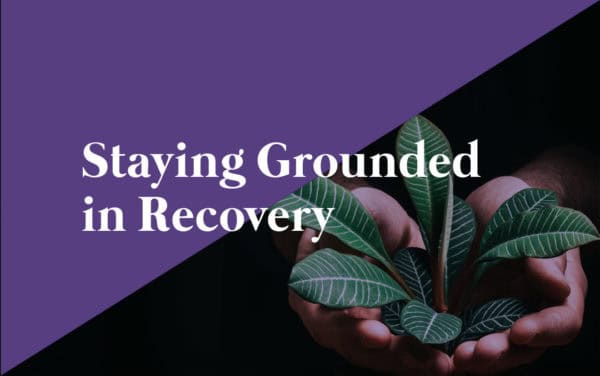
by Kerri MacFarlane | Oct 15, 2021 | Blog, Early Sobriety, Helpful Tips, The first Year, Uncategorized
What do you do when you get a craving? When you’re in that moment and your next move may decide whether you pick up a bottle, or not. And how do you feel when you’re in that moment?
For example…I feel anxious, I feel panicky and I feel nervous.
In a recent therapy session I shared with my therapist that since my recent relapse I have been noticing I am having more frequent moments of feeling anxious and feeling cravings come up. I don’t know if these feelings are really more frequent or if I am just paying closer attention now…but regardless, the feelings are there either way. (Side note – Back to 72 days alcohol free as of this writing!),
She asked me what I do when these feelings come up? Did I know what grounding was, did I use any grounding techniques or grounding exercises when I was “in” those moments?
I know what being grounded is…I was grounded a lot while growing up. ? And I’ve heard the term grounding used with earthing…walking around outside barefoot, which I also do a lot of. But she was talking about something else.
She gave me some grounding techniques that I had never heard of…that I could do anywhere, at any time. I’ve used these…and I have found them helpful. They help me turn my attention away from my anxious mind and off the craving…help me refocus on the present moment. And help me move into the next hour sober. I’m going to share some of them with you and maybe you will find them helpful as well. ??
The 5-4-3-2-1 Grounding Technique (or the 5 Senses Technique)
Our physical body is how we interface with the rest of reality, the five senses like tethers anchoring us to the moment.
- Look For 5 Things You Can See: Look for the small details, the wood grain on the desk in front of you, the pattern in the ceiling. Become aware of the glossy green of the plant in the corner. Take your time to really look and acknowledge what you see. Maybe look for something that you may not have noticed before.
- Become Aware Of 4 Things You Can Touch/Feel: The clothing on your body, your cotton shirt against your neck. The warmth of the sun on your skin. The wind blowing through your hair. The chair you are sitting on. It may help to vocalize these…”I feel the wind blowing through my hair, I feel the warmth of the sun on my face.”
- Acknowledge 3 Things You Can Hear: Pay special attention to the sounds your mind has tuned out. Don’t judge, just hear. The distant traffic. The ticking of the clock. The roosters outside. (I’m in Hawaii as I write this, there are a lot of roosters outside. ?) The voices in the next room.
- Notice 2 Things You Can Smell: Try to notice smells in the air around you, like an air freshener or freshly mowed grass. If at first you don’t feel like you can smell anything, simply try to sense the subtle fragrance of the air around you, or of your own skin.
- Become Aware Of 1 Thing You Can Taste: I suggest carrying snacks for this step…because, snacks…duh. Pop one in your mouth and focus your attention closely on the flavors.
Repeat, repeat…as many times as needed. ??
Another grounding technique she shared with me was like playing a game of “categories” with yourself.
Pick a category (types of dogs, fruits and veggies, cereals, jazz musicians, animals, famous people, cars, TV shows, writers, sports, songs, cities, etc.) and name as many items in the category that you can think of. For a variation name the items alphabetically or try to name an item in the category that begins with each letter of the alphabet. This can also be a great game to keep kids preoccupied in the car!
For some more grounding techniques Paul shared some of his here.
Like I said in the beginning…I had a recent relapse. Weirdly I feel alright about that. I have found these quick and easy grounding techniques to be very helpful for me at this stage of my journey. I hope that they may help you too.
If you have any that you use and would share, please drop them in the comments!
Until next time, be well.
Kerri Mac ?
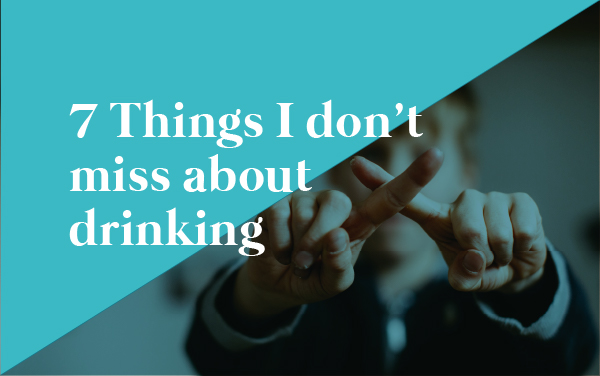
by Kerri MacFarlane | Jun 15, 2021 | Alcohol Relapse, Blog, Early Sobriety, Helpful Tips, The first Year, Uncategorized
There was a time that I was afraid to stop drinking. I was afraid that I would fail. I was scared about removing something from my life that had been a part of my life for over 30 years.
I thought drinking made me fun…so by quitting I would be boring. I would lose friends. Which in hindsight was crazy thinking since I drank at home, alone, for the last 15 or so years. I didn’t have friends…drinking friends or not. Sounds like the opposite of fun to me now.
In the beginning the thought that I would have to be ‘in recovery’ for the rest of my life was depressing and overwhelming. Was I always going to have to work so hard? Was whether or not I was drinking going to be my only real story? I now see recovery as a gift.
I am truly grateful for my recovery and being in recovery. I can now take a step back and list off things that without my recovery I wouldn’t have. Things I’ve gained. Things I’ve regained.
I can also step back and remind myself of the things I don’t miss about drinking. Here’s a few of them.
1️⃣ The hangovers. The bloody hangovers. This is probably the main thing we can all relate to and the first thing that comes to mind when someone asks you what you don’t miss about drinking. Peeling your eyelids open, the pounding headache, nausea, vomiting, dehydration, shakes, lack of energy. There was a time that was my everyday routine. I would either sleep the day away, finally starting to feel human again later in the afternoon…when I would start drinking again. Or I would have a couple shots early in the morning to help get me through the day. My motivation and productivity was at zero. I don’t miss the hangovers.

2️⃣ The blackouts. Waking up and checking my phone in fear…when I could find my phone. Who did I talk to? What did I say and do? Not having a conversation the next day because I very well already had the conversation the night before and don’t remember. Playing detective the next day. I was a blackout drinker from day 1. I don’t miss blacking out.
3️⃣ The anxiety, the shame and regret. 3:00 am was the worst. I would get up and drink…if I could find the bottle I hid…just so I could fall back asleep. I never really thought I had anxiety until I stopped drinking and it went away. I don’t miss not sleeping properly, I have never experienced sleep like I have since I quit drinking alcohol, it really is incredible. I don’t miss the anxiety, the shame and regret.
4️⃣ Apologizing…over and over…again and again. It’s true that action speaks louder than words. But I truly was sorry that I drank, again. I truly was sorry that I said I wouldn’t, but I did. I don’t miss sounding like a broken record with the apologies.

5️⃣ Always thinking about alcohol. I don’t miss thinking about alcohol all the time. Have I got enough? Should I go and get some more? What if it runs out? Is it too early in the morning to go buy more? The mental energy spent when drinking is exhausting. I don’t miss always thinking about alcohol.
6️⃣ The harm to my health and physical appearance. My skin looked like shat. I had bags under my eyes. I looked years older. I ate junk food in excess. I had high blood pressure. I couldn’t sleep. I had no energy. When you’re actively drinking you don’t necessarily realize the toll it’s taking on your body, or you just don’t care. But when you remove alcohol, it becomes pretty obvious how it was affecting you physically. I don’t miss harming my health and good looks. ?
7️⃣ Disappointing the people I love, disappointing myself. Not to say that after ditching the booze I never disappointed the people I love or myself again. Because that is just not true. I am human after all. But I can say I stopped the groundhog days of doing it. And once I was able to let go of the shame I was able to believe that I am not a failure because of my failures. And I was able to start rebuilding relationships…the most important one being the one with myself. I don’t miss repeatedly letting those I love down.
There’s more I could add…but I’ll stop there. I feel the longer I am in recovery the longer my list will get. Some days it is easy. Other days I have to use more of my tools. It’s not saying no to alcohol, it’s saying yes to a better life. And there are wonderful things on the other side…you just have to trust yourself you CAN get there.
But it really is worth it.
Until next time, be well.
Kerri Mac ??
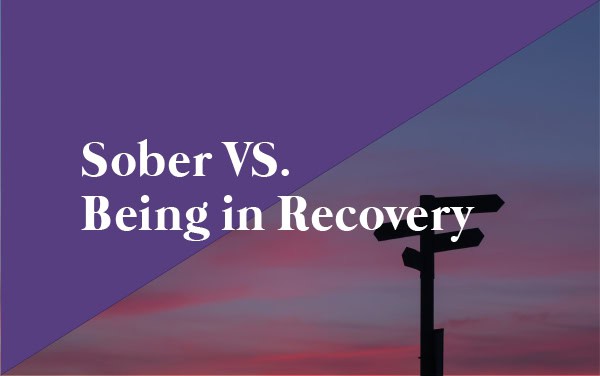
by Kerri MacFarlane | Apr 18, 2021 | Alcohol Relapse, Blog, Early Sobriety, Expectations, The first Year, Uncategorized
“I’m sober.”
“I’m in recovery.”
Two statements that very often get interchanged. If you think they mean the same thing, think again. There is a distinct difference. Being sober is very different from being in recovery. You can be one or the other…or you can be both.
Choose both.
What Is Sobriety?
When you have eliminated alcohol from your life you are deemed “sober,” and although sobriety is part of recovery, sobriety alone is often a temporary and fragile state. Think of the terms “white knuckling it” and “dry drunk”.
White knuckling your sobriety means you are trying to manage your addiction without help. You are using your will power or trying to fix yourself with your mind.
A “dry drunk” is someone who is sober but is struggling with the emotional and psychological issues that led them to have a problem with alcohol in the first place.
Just because you no longer live under the influence of alcohol it doesn’t mean that other unhealthy aspects of your life have changed. For example, you may still have poor or damaged relationships, behavioral health issues, mental health issues, or emotional issues that need to be addressed.
Sobriety is considered to be the natural state of a human being at birth. A person in a state of sobriety is considered sober.
What Is Recovery?
There is no “standard” definition of “recovery” in the addiction community, and part of the reason why is because everyone’s recovery journey is unique. ??
According to SAMHSA, recovery is “a process of change through which people improve their health and wellness, live self-directed lives, and strive to reach their full potential.”
A person in recovery is continually making an effort to work through the issues that caused the alcohol abuse to occur in the first place.
In recovery is a powerful period because beyond everything else, it signifies that you know you have a problem and you are trying to fix it. Recovery allows you to make positive changes and deeply examine your feelings, beliefs and behaviors. Recovery does not mean you fix your issues right away. It means you recognize something is wrong, which is the first step and a critical part of getting help.
People in recovery have the greatest chance of maintaining long-term sobriety. Better yet, they have the opportunity to live a happy and productive life that is free from addiction.
I love this list that Odette shared on the podcast, episode 316…titled the same as this blog…”Sober” VS “In Recovery”.
When you are in Recovery, you:
- Feel a kinship to those who are also in Recovery. (SO true!)
- Make decisions based on how it could impact your Recovery. (“My recovery must come first so that everything I love in life does not have to come last.”)
- Adjust friendships and relationships based on how they could affect Recovery. (BOUNDARIES!!)
- Never let down your guard. (I don’t got this!)
So, can you be sober and not be in recovery? Absolutely! And although you can achieve a state of sobriety with simply abstaining from alcohol, with time, you will come to find that the life you want comes not just from being sober but from entering into the recovery mindset. ?
And you know what the cool thing is? You don’t have to be an alcoholic to live in this mindset. ? The mindset that allows you to grow and develop your self awareness, the mindset that allows you to see beyond the surface and question many things in life like relationships and boundaries. That mindset is for everyone.
Once I got past the early days of sobriety I started thinking of my sobriety journey as my recovery journey. I realized that it was about SO much more than just ditching the booze. That the recovery process is one of ongoing healing and that there is no part of my life that my recovery doesn’t touch.
I also learned that it is rarely accomplished alone. I wanted to be around others ‘in recovery’. Not just because they were sober and could relate to that part of my life. But because they want to grow, want to learn, want to be better.
Transitioning from sobriety to recovery takes both commitment and action.
If you are a grey area drinker or someone who doesn’t even know if they belong here because you are not alcoholic enough…I hope you know that recovery is for EVERYBODY.
E V E R Y B O D Y.
You have your seat at this table, no matter what.
Until next time, be well.
Kerri Mac ??

by Kerri MacFarlane | Jan 20, 2021 | Blog, Early Sobriety, Helpful Tips, Nature, Uncategorized
Nature.
I can get lost in it. It’s where I can recharge my soul. And it’s one of my most used tools in my recovery toolbox. I feel better when I spend time outdoors. And when you feel better you are less likely to ‘relapse’. BONUS!
One of the great things about nature is that it is EVERYWHERE. I think that’s important to remember…especially during times such as these…with so much quarantining and isolating. IT’S EVERYWHERE. We are spending so much time indoors and online, when nature can help our brains, our bodies and our recovery.
Just a few of the favorable rewards we can get from nature are:
- Being in nature reduces stress and anxiety!! Hell yes! Better than anything you can find in pill form! And free! Calming nature sounds (even outdoor silence) can lower blood pressure and levels of the stress hormone cortisol, which calms the body’s fight-or-flight response.
- Find yourself feeling a little crabby and cantankerous? Get back to nature! Research in a growing scientific field called ecotherapy is showing a strong connection between the time we spend outdoors and our moods.
- You will see an increase in your focus, concentration and creativity…which in early sobriety, as your body adjusts to a life without alcohol, is common to see the opposite.
- You’ll see an improvement in your short term memory.
- Less loneliness and boredom….which can often be ‘relapse’ triggers.
One of my favorite things to do outdoors is Geocaching! Have you heard of it? It’s like a treasure hunt. ?? And it’s worldwide. I try and do it on all my travels. One of the things I like most about it, other than I just find it a lot of fun, is that it helps me get out of my head and my thoughts. I’m just out in nature looking for that next smiley face. ? (If you’re a cacher too, you know what I mean.?)

I also LOVE to hike.
My husband and I have 3 large rescue dogs…
Acelyn, Bobo and Noggin.
I call them my pound puppies.
When the weather allows it we
take them and go hiking every
Sunday we can.
There are tons of outdoor activities that will help you add a little more nature to your life. Some suggestions…
- Go for a walk, a bike ride
- Create a backyard garden.
- Find a quiet grassy hill, or bubbling brook, and meditate.
- Look up the local parks in your area…and visit them!
- Take a nap in the park.
- Skip rocks.
- Look under rocks.
- Go birdwatching! Another fav of mine that I’ll do for hours in the morning from my very own backyard. I live on a greenbelt and have a creek in my backyard…so LOTS of birds!
- Take up outdoor photography. (This is on my list!)
- Rock Climbing
- Fishing
- Solo backpacking or camping. (Also on my list!)
- Go look for wildflowers.
- Sit and listen to the wind in the trees.
- Find the end of a rainbow.
- Hug a tree! (Like my daughter and granddaughter are doing in this picture! ??)


If you can't make it outside then try listening to nature sounds, not exactly
the same but it can have a similar effect.
I love this quote, by Eckhart Tolle, from Stillness Speaks.
“When walking or resting in nature, honor that realm by being there fully. Be still. Look. Listen. See how every animal and every plant is completely itself. Unlike humans, they have not split themselves in two. They do not live through mental images of themselves, so they do not need to be concerned with trying to protect and enhance those images. The deer is itself. The daffodil is itself.
All things in nature are not only one with themselves but also one with totality. They haven’t removed themselves from the fabric of the whole by claiming a separate existence: “me” and the rest of the universe.
The contemplation of nature can free you of that “me,” the great troublemaker.”
That last line nails it…”The contemplation of nature can free you of that “me,” the great troublemaker.”
“Free you of that “me.”
On top of all the benefits I listed above getting out and being one with nature can help you get out of your own head. To just be yourself.
Do as the deer and the daffodil, do.
I’d love to learn how you spend your time in nature. ?
Until next time, be well.
Kerri Mac ??
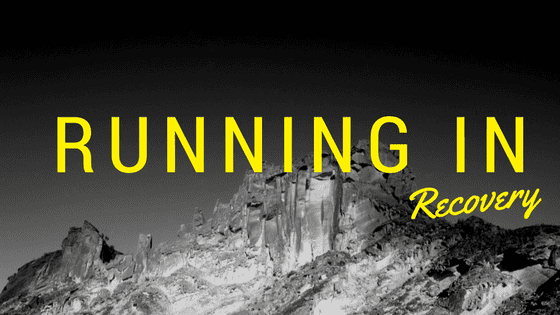
by Paul Churchill | Aug 16, 2016 | Uncategorized
Four years ago today I ran 26.2 miles in three hours, five minutes, and 42 seconds. It was and still is the shortest length of time it has taken me to complete that distance. I am extraordinarily proud of that personal record, but I feel as though it should have several asterisks after it, because the number doesn’t even begin to tell the whole story.
The average person, for example, might look at that number and be mildly impressed. He or she may be familiar with the marathon distance, may have several friends who’ve completed one in 4:xx or 5:xx, and may think, “wow, that’s pretty quick, especially for a woman.” He or she would not know that I logged 80-100 mile weeks from January through April of that year, or that I completed dozens of workouts that indicated I was capable of a sub-3 hour marathon. This individual, unless he or she were compelled to look closely at the splits from that humid June morning, would not know that I ran 21 miles at 6:45 pace before succumbing to stomach issues and dehydration.
But perhaps most important: no one who saw that race result could possibly have any idea that it marked the beginning of a slow and painful decline in the form of alcoholism. Prior to that race, I was able to balance my training with my drinking, but that summer it started becoming more difficult, and in the months that followed, when I had to make a choice between alcohol and running, alcohol started winning.
I have not run a strong marathon since.
One month and two weeks ago today, at 36 days sober, I completed a training run in preparation for another marathon. My goals for this race, while realistic, were optimistic. I hoped to get to the starting line healthy and injury-free. I hoped to run a strong, confident, smart race. I hoped to restore a little bit of confidence that maybe I can continue to improve at this sport. I hoped to qualify for Boston, something I haven’t done in nearly two years, despite easily qualifying in my first-ever marathon back in 2007.
I finished the aforementioned run, 16 miles at about 8:00 pace, around 7:45pm that evening.
Fifteen hours later, I was called to a conference room and informed that, after ten years of better-than-average evaluations, I was no longer gainfully employed. “Your position has been eliminated,” they said without emotion. Almost immediately, the sinister voice was awakened. “You don’t have to get up for work tomorrow,” it hissed.
Twenty-four hours later, I was drunk out of my mind and had completely forgotten about not only running, but everything that matters in this world, and everyone who cares about me.
Forty-eight hours later, I was still drinking.
One week later, I was drinking literally around the clock and wanted only to be unconscious. I’d wake up sick and shaking at 5:00 am, reach for the bottle next to my bed, drink what was left of it, and (if I was lucky) return to a brief and merciful state of semi-consciousness, where I could forget the hell that my life had become. Several hours later, when the stores opened, the cycle started over. I stopped caring if anyone saw me. I stopped trying to hide what I was doing. I went to bars and I went to liquor stores. I drank. I remember some of it. There was a kind bartender who held onto my wallet after I dropped it before stumbling home. A lunch date with a good friend during which I tried unsuccessfully to string together sentences, failing miserably, while spilling food all over myself. (He later admitted that he was “shocked” at my appearance.) There was a woman who caught my arm as I fell backwards, asking gently where I lived and if she could help me. I couldn’t tell her; I knew, but I couldn’t use words. I slurred helplessly and tried to run away, falling over and over again before finally finding my front door, and eventually, my bed.
(I’m going to stop here and state for the record that I live in a city known for its high-crime rate, a city about which not one buttwo award-winning TV shows have been created documenting such crime, and yet no one tried to hurt me or take advantage of me in this horrifying state. I experienced nothing but kindness.)
Two weeks, three days, and approximately one hour after that last training run for the marathon I never started, I took my last swallow of alcohol, and the following day I did the unthinkable: I checked myself into rehab.
I completed inpatient treatment on June 8, 2016. That same afternoon I ran again in the sunshine for the first time, and I felt something different, something indescribable.
In four days I will celebrate one month sober, again.
This is a different kind of marathon. There is no finish line for this one, no stopwatch, no competition, no medal.
But it’s the most important race I will ever run.












